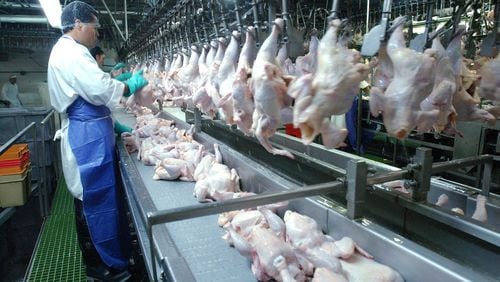A Georgia chicken processor has taken the city of Dawsonville to court in its yearslong fight against what it says are illegal water and sewer costs that threaten to shutter one of its factories and put 400 people out of work.
Gold Creek Foods, which claims to be one of the country’s largest “full-service” chicken processors, filed a lawsuit in a Georgia federal court Friday against the city and its mayor, council members, manager and utilities director.
The business says it’s been slapped with more than $1.5 million in illegally assessed surcharges, penalties and costs since October 2022 alone as a result of the city’s botched testing of wastewater from its Dawsonville plant. The 91-page lawsuit aims to stop the city from enforcing the charges and shutting off water and sewer services to the plant.
Gold Creek CEO Mark Sosebee said the city has refused to work with the business, a “committed community partner,” to find a solution.
“We’ve invested millions of dollars in this facility to ensure environmental compliance, and we’re dedicated to providing a great environment for our employees and, of course, clean water for this community,” Sosebee said in an April 12 press release. “The actions of the city of Dawsonville are very disappointing.”
In a statement provided to The Atlanta Journal-Constitution, the city denied Gold Creek’s allegations and said its only goal in regard to its wastewater rules is to ensure they are followed for the good of the public and environment. The city said it believes Gold Creek is “often in violation” of those rules, based on information it has received and consultation with wastewater professionals.
“The city is obviously disappointed that Gold Creek chose the path of litigation over continued negotiation,” the city stated. “The city requested (on March 21) that Gold Creek Foods make a proposal to the city for how the parties could move forward. Instead, just over three weeks later, Gold Creek Foods filed its lawsuit.”
Dawsonville, about 50 miles north of Atlanta, has been home to the Gold Creek poultry processing plant since 2004. Gold Creek has seven other Georgia facilities, in Gainesville.
Gold Creek said its Dawsonville site employs 402 people and operates 24 hours a day between five and seven days a week. The plant processes about 3.4 million pounds of poultry and uses about 181,000 gallons of water each week. Product from the plant, including tenders, nuggets, fillets and strips, is consumed by people throughout Georgia and elsewhere, per the complaint.
At the heart of the dispute is Gold Creek’s industrial wastewater. The business said it treats the plant’s wastewater before it is discharged to Dawsonville’s public sewer and wastewater collection system, in compliance with a permit from the Environmental Protection Division of the Georgia Department of Natural Resources.
Gold Creek said it spent about $1 million on a wastewater treatment facility in 2018 to meet the state’s “very high standards.” It said its own weekly testing shows wastewater discharges are in compliance with the permit.
The business said it also discharges sewage to Dawsonville’s public system, for which it does not need a permit. It claims the city has been testing the plant’s wastewater at a point where it mingles with sewage, leading to skewed results upon which the city has wrongly based penalties for wastewater ordinance violations.
“Defendants are improperly using a threat of disruption of water and sewer service as leverage in an attempt to force Gold Creek to pay exorbitant, illegal and unwarranted surcharges, penalties and costs,” the lawsuit states.
Gold Creek says Dawsonville has a monopoly on city water and sewer services, for which it is the only industrial customer. It claims the city wouldn’t allow it to instead receive the services from Etowah Water & Sewer Authority, another water utility company in Dawson County.
The city has changed its wastewater-related ordinance several times since 2020, when it began sending Gold Creek threatening letters with invoices for wastewater surcharges, the business said. It wants the court to declare that the ordinance is unconstitutional, claiming an appeal to the city would be futile.
“Up until October of 2022, these invoices for monthly industrial surcharges of wastewater were paid, many under express protest,” Gold Creek said in its lawsuit. “Beginning in October 2022, the city’s surcharges against Gold Creek drastically increased in size.”
In its press release, Gold Creek said it had given city officials access to its plant and the results of its own investigations, but “has been stymied in its efforts to obtain the city’s approval to investigate the city’s sewers to determine what the problem is.”
Stephen E. O’Day, an attorney for Gold Creek, said Dawsonville isn’t complying with its own ordinance or federal and state law.
“Gold Creek is the only person or entity whose sanitary sewer discharges are sampled by the city, and against whom millions of dollars in fines and penalties are assessed as a result,” he said.







